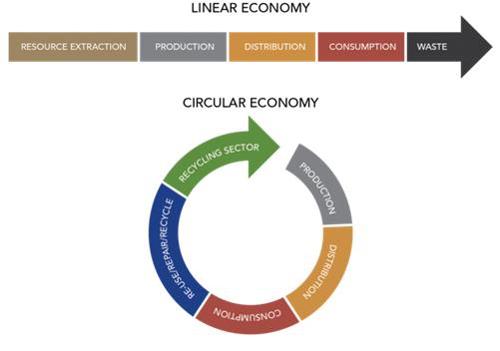What is a circular economy?
 In our existing economy:
In our existing economy:
- we take resources from the ground, air and water
- we make them into products and structures
- then we dispose of them.
A circular economy operates by:
- designing out waste and pollution
- keeping products and materials in use
- regenerating natural systems
We have made a lot of progress in reducing the amount of waste we dispose of, by segregating wastes and recycling them. We are also making progress in the use of resources, by looking at energy, water and materials efficiency. New processes, and new products that are designed to minimise waste are key to developing a more circular economy.
For example, we mine aluminium ore, smelt it into aluminium and manufacture drink cans and other products. Many of these products are used once, and then disposed of. Recycling rates are improving, and the manufacturing process is using less aluminium, but there is still a loss of materials, mainly to landfill. This means more aluminium needs to be mined and smelted. If all aluminium could be retained from goods that were designed to be reused or taken apart when they reach the end of their useful life, this would significantly reduce the need for primary extraction.
This is an example of what is meant by the circular economy.
This guideline explains what actions you can take to support the shift in focus from making improvements to existing manufacturing methods, to creating new methods of design and manufacture that will help to move us towards a circular economy.
Benefits to our economy
- creates new business opportunities
- creates new jobs
- increases resilience to global material scarcities
- reduces waste to landfill
-
an essential part of a net zero economy
In the following sections, this guideline also explains how taking these actions can benefit your business.
Further information
- Northern Ireland Business in the community: Circular Economy Hub
- Northern Ireland WRAP: Circular Economy
- Circular Communities Scotland
- Scottish Government: Making things last – a Circular Economy Strategy for Scotland
- Zero Waste Scotland: Encouraging the development of new circular economy solutions in Scotland
- UK Circular Economy Package policy statement
- Ellen MacArthur Foundation: Resources for Circular Economy
- Global Footprint Network
